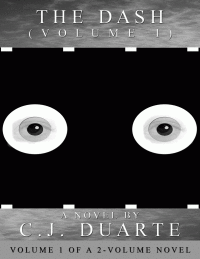Author: C. J. Duarte
Title: The Dash: Volume I
Publisher: Baico Publishing
ISBN: 9781926945354
Pages: 716, Kindle/Paperback
Genre: Fiction
Author Interview with C.J. Duarte
Interviewed by: Kristee Schnee, Pacific Book Review
Today we’re talking with C.J. Duarte, author of “The Dash: Volume I”.
PBR: What inspired you to write The Dash?
I was inspired both by the encouragement of some teachers I had, and by my own desire to write at least one major book in my foreseeable future. I wanted to record various character impressions I’d developed over the years, and share my feelings about life, death and other issues, and tie it all into a very simple but widely-interpretive story. Claire Bead (The Dash’s main character) is not that different from me, in that she’s very much feeling her way through existence, maybe not understanding all of it, but certainly having the sensitivity to absorb it all the same.
PBR: Is there a message in your novel that you would like readers to understand?
There are countless messages I’d like readers to understand. As a few examples, I’d like them to come away with the idea that there’s more to life than what we see; that it’s important to have balance in one’s life—between clarity and mystery, as an example; and that death is not necessarily the end. Also, that creativity is a great tool that can nourish us in a way many other disciplines just can’t.
PBR: Is there anything you found particularly challenging in writing this novel?
It was challenging to keep track of several characters and subplots, even with all the detailed plans I’d written. Otherwise it was fairly organic, the way it all came out and then came together. I’m very proud of the fact that, even with all the layers, I still managed to give it some consistency to keep it anchored, to make that world more immersive.
PBR: Considering hindsight is 20/20, would you change anything in The Dash?
There is nothing I would change in The Dash. This was a great labor, quirks and all, and I’ll always stand by it. At the same time, I’m more willing than most authors to let the work find its own way after release, as opposed to force-feeding it to people all the time and potentially courting disaster.
PBR: What is the hardest part of writing fiction?
The hardest part to me is leaving the work entirely alone, especially with the lengthy and meticulous style I aimed for in The Dash, and in other projects I’m working on now. Even long after it’s done, I’m always tweaking minor aspects most people would never notice: glitches, typos, etc. I suppose that’s another hard part of writing, which is worrying about absolute perfection at all times, but the bottom line is: because it’s your baby in a way, it will always be “perfect” no matter what, and that’s quite reassuring.
PBR: Did you learn anything from writing this novel? What was it?
A big lesson for me was that sometimes, you can’t write a really solid book without taking a long, long time. I’m also one of those writers who don’t like to talk much about their work, for fear of taking away some of its mystique. So keeping much of it under wraps (which I did with this novel) is another strong lesson in my view, because it can make you more honest and effective with your craft.
PBR: What are your current projects?
I’m currently working on another novel, among similar works, that will be just as heavy and untried as The Dash was, if not more. Certain styles and themes will carry forward from that book, and there will be quite a few surprises in it that I hope will interest readers. And now the bad news: I have no idea yet when these projects will come out, due to the incredible amount of work involved, but I’m hopeful that whoever loved The Dash will be patient enough for what comes next, no matter how long it takes.
PBR: Do you recall how you became interested in writing?
From the time I was extremely young, I remember being most interested in my own imagination. Reading and writing started to jump out more than other pastimes like music or art, so I guess that’s how it began. Plus I seemed to do better at writing in school, and numerous teachers and family members were very encouraging of it.
PBR: What books (fiction or nonfiction) have most influenced your work?
I’m influenced by just about everything I read, which is very fiction-centered, and mostly from the late-nineteenth and twentieth century—a bridge that mirrors my general taste, actually: not too old-fashioned, not too modernist. No matter the category though, certain traits have stuck with me: the fanciful world-jumping of Carroll’s Alice in Wonderland; the rich thematic scope of Tolstoy’s War and Peace; the stark atmosphere and weird language of Orwell’s Nineteen Eighty-Four…Even now I’m always reading or revisiting certain titles, because I’ve been through so many that a great deal of influence can be forgotten and should be regenerated.
PBR: Do you have any advice for young writers?
My only advice at this point is to simply write what you want. In many creative pursuits, it’s easy to forget about your own drive and think too much about pleasing everyone. It’s all fine to write for others, but there should also be a sense of individuality in the work, which I think will hold it up better over time.
PBR: Do you have anything that you would like to say to your readers?
I would like to say: wherever you are, I appreciate your interest and support so much. Thank you for giving my material a chance, and for motivating me to continue. It will not be forgotten.
To learn more about”The Dash: Volume I” please read the review at: Pacific Book Review.



Follow Us